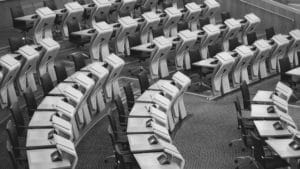At a press conference streamed live on Youtube on Friday, Alex Salmond launched the Alba Party – the vehicle he hopes will deliver his return to front-line politics.
It follows hard on the heels of allegations, counter allegations and the bitter war of words that surrounded the harassment inquiry, formalising the rift between the current and former First Minister and their political supporters. Though pledging a positive campaign aligned with the mission of independence, this is an attempt to re-establish a power base within the SNP. If the mission is to make the early days of the campaign all about Alex, the early tactics appear to have worked – a daily trickle of defections alongside pledges on women’s rights, reviewing the Hate Crime legislation and offering to co-write the next prospectus for independence – are keeping him in the daily headlines.
So, what do we know so far?
As of Monday 29 March, the sign-ups are as follows:
- Alex Salmond – NE Scotland
- Kenny MacAskill MP – the current MP for East Lothian will lead the Lothian list
- Neale Hanvey – current MP for Kirkcaldy & Cowdenbeath
- Corri Wilson – the former MP will stand for South of Scotland
- Eva Comrie – standing for Mid Scotland & Fife
- Cynthia Guthrie – South of Scotland
- Cllr Chris McEleny – Inverclyde councillors – will stand on West of Scotland list
- Cllr Lynne Anderson – North Lanarkshire councillor, was SNP equalities convener on NEC
- Cllr Michelle Ferns – councillor for Shettleson ward on Glasgow City Council – will stand on the Glasgow list
- Cllr Caroline McAllister – depute leader on West Dunbartonshire Council, was SNP women’s convener on NEC
- Tommy Sheridan – the former Scottish Socialist Party leader
Conferences
The party will host a candidate conference on Saturday 3 April.
Alba has also announced it will host a women-only conference on Saturday 10 April as part of putting women at the “front and centre” of key decisions.
Policies
The stated aims of the party describe it as “social democratic”. Writing in The National, George Kerevan suggests: “Early adherents to Alba are of the Salmond generation and more likely to be traditional social democrats influenced by economic issues.”
Salmond has suggested that a position will be taken opposing aspects of the hate crime legislation, likely to be related to women’s rights. Eva Comrie is drafting a policy paper on women and equalities ahead of the April conferences.
The party says it will be “gender-proofing” all its policies.
Electoral Plans
The party will only field candidates for Scotland’s eight regional lists (the ‘second vote’) and will aim to register at least four candidates in each area.
The aim will be to pick up “wasted regional votes” for the SNP. The regional voting system – known as d’Hondt – allocates seats using the Additional Member System. The proportionality built into this system makes it harder – but not impossible – for parties that do well in constituencies to pick up regional list MSPs. Whereas an entirely new nationalist party would not be hampered by any constituency vote ‘penalty’ when attempting to win regional list seats.
The Alba Party will seek to challenge the ‘Both Votes SNP’ campaign by suggesting that splitting the vote SNP/Alba will increase the independence tally and deliver a ‘supermajority’. This was already the approach of the smaller pro-independence parties, but a Salmond-fronted campaign will certainly be a more disruptive presence in the campaign.
Alex Salmond suggested this strategy could generate up to 90 independence-supporting MSPs on 6 May. That’s a tall order. A supermajority at Holyrood would be 86 of the 129 seats and is the requirement for passing certain legislation on some constitutional issues, for example the recent Scottish Elections (Franchise and Representation) Bill.
Salmond says that “a million votes” cast on the regional count for the SNP elected only four MSPs in 2016 and potentially none in 2021.
Alex Salmond’s pitch today was all about the need to deliver a legal referendum, suggesting that only this supermajority would persuade the Prime Minister to grant the legal powers required for a second referendum. He said “Boris Johnson versus the Scottish Parliament” (as opposed to a battle between party leaders or governments) would make it much harder for the PM to deny the legal order that’s required.
Asked about the potential for the party to hold the balance of power after 6 May, the former FM ruled out coalition or formal agreement.
What are the other parties saying?
Nicola Sturgeon said: ““There are significant questions about the appropriateness of his return to public office, given some of the concerns that have been raised about this conduct but that is a matter for voters to judge on and decide.”
Following news of Kenny MacAskill’s defection, SNP Westminster leader Ian Blackford said the East Lothian MP had become an “increasing embarrassment” and described his departure as “somewhat of a relief”. He is calling for a by-election in East Lothian.
Scottish Conservatives are launching a “Unionist manifesto” and Douglas Ross has sent letters to Anas Sarwar and Willie Rennie asking for a meeting to agree how they can work together. The Unionist manifesto includes three pledges for each party to sign up to:
- a) vote against a second independence referendum regardless of the result in May’s election.
- b) rule out a coalition or confidence deal with any party who seeks to hold an independence referendum in the next Parliament.
- c) agree to form a pro-UK, anti-referendum coalition if the opportunity arises.
Anas Sarwar said: “The people of Scotland deserve so much better than the score settling and old politics that the SNP and Tories are offering.
Scottish LibDems said “There are no questions about Scotland’s future to which Alex Salmond is the answer.”



